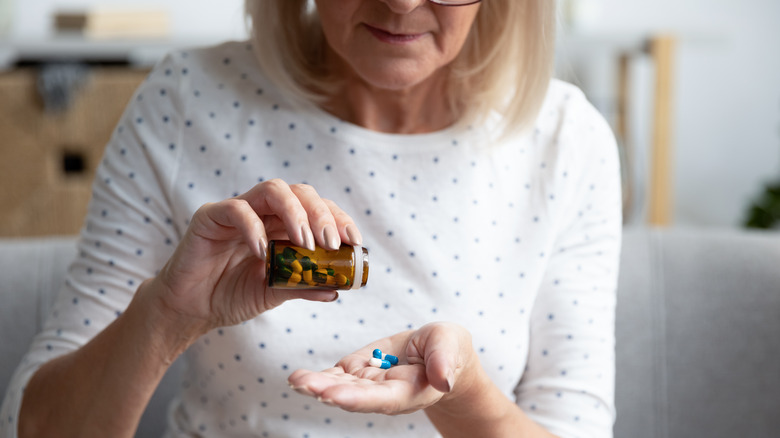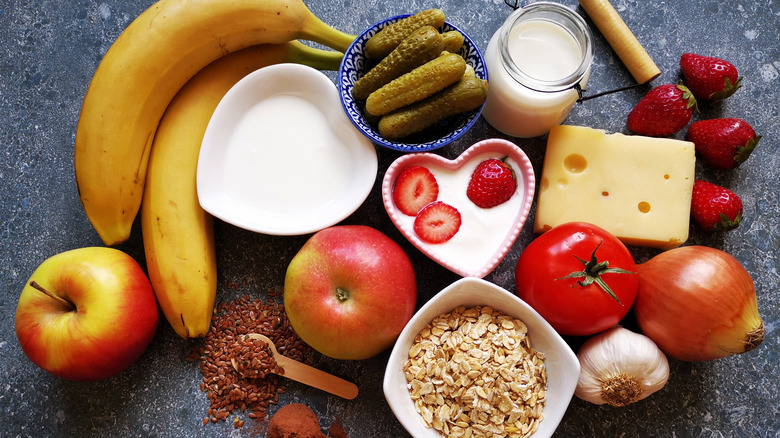Can Antibiotics Cause Stomach Issues?
Have you ever experienced stomach pain, diarrhea, or bloating after taking antibiotics? These side effects are relatively common, as most antibiotics can disrupt the gut flora and cause all sorts of symptoms, explains Henry Ford Health. For example, metronidazole — an antibiotic prescribed for bacterial vaginosis — can make you feel nauseous or even give you a headache (via MedlinePlus). Other side effects may include stomach pain, hives, dizziness, seizures, and aching joints.
These medications help treat bacterial infections but can also harm the good bacteria in your system, according to Henry Ford Health. In some cases, they may disrupt the vaginal flora and promote yeast overgrowth, leading to vaginal candidiasis, notes the Mayo Clinic.
Furthermore, vancomycin and other broad-spectrum antibiotics can put you at risk for life-threatening fungal infections and systemic bacterial co-infections, according to recent research published in Cell Host & Microbe. As it turns out, these drugs may interfere with IL-17A and other immune cells in the human gut, affecting their ability to fight pathogens.
With that in mind, here's what you should know about the impact of antibiotics on digestive health and how to protect your gut.
Antibiotics can wipe out good gut bacteria
The human gut is home to trillions of microorganisms that regulate digestion, metabolism, immune function, and other processes, explains a 2018 review article published in the journal Frontiers in Microbiology. Some microbes also produce key nutrients and help your body break down cholesterol, fiber, lipids, and starches. Antibiotics work by destroying disease-causing bacteria, but they also wipe out good gut bacteria, notes Henry Ford Health. Therefore, these drugs can affect gut microbial diversity and cause an upset stomach.
A common side effect is diarrhea, a symptom observed in up to 35% of patients receiving antibiotic treatment, according to a 2020 article presented in Frontiers in Cellular and Infection Microbiology. Certain antibiotics, including ampicillin and fluoroquinolones, can lead to Clostridium difficile infection, a bacterial condition associated with severe diarrhea. There's also a risk of infection with Helicobacter pylori, a bacterium that may cause stomach ulcers and gastric cancer.
These medications can also interact with alcohol, which may increase the risk of side effects, says the Mayo Clinic. It's not uncommon to experience nausea, vomiting, digestive discomfort, or high blood pressure because of this interaction.
But even if you don't drink alcohol, you may still feel sick while on antibiotics. The National Health Service reports that about one in 10 people will experience nausea, diarrhea, indigestion, bloating, poor appetite, and stomach pain during treatment. However, these side effects should subside soon after you finish your antibiotics.
How to protect your gut flora while taking antibiotics
Most antibiotics reduce gut microbial diversity, notes a 2020 review published in the journal Frontiers in Cellular and Infection Microbiology, and therefore, it's important to restore your intestinal flora. For starters, consider taking a daily probiotic. These supplements may help prevent antibiotic-associated diarrhea by repopulating the gut with good bacteria, according to 2014 research featured in the World Journal of Gastroenterology. Alternatively, fill up on probiotic-rich foods, such as yogurt, kefir, kimchi, sauerkraut, and pickles.
Prebiotics can help, too. These nutrients come from food or supplements and work by feeding the good bacteria in your gut, explains the Cleveland Clinic. A diet rich in prebiotics may boost digestive health, regulate appetite, and improve immune function, among other benefits. So, make sure you eat plenty of fruits, vegetables, and whole grains, especially oats, legumes, potatoes, apples, and green bananas. For example, garlic and onions contain inulin, a prebiotic fiber that aids in digestion.
Apart from that, you may want to take milk thistle, and other supplements for liver health, suggests integrative medicine specialist Chris Kresser. Antibiotic use is a leading cause of drug-induced liver injury, accounting for over 46% of cases, notes the University of Michigan. In clinical trials, milk thistle has been shown to reduce liver injury caused by medications, reports a 2010 review published in Phytotherapy Research. Ginger is a good choice, too, as it may help ease nausea and vomiting, two common side effects of antibiotics.



